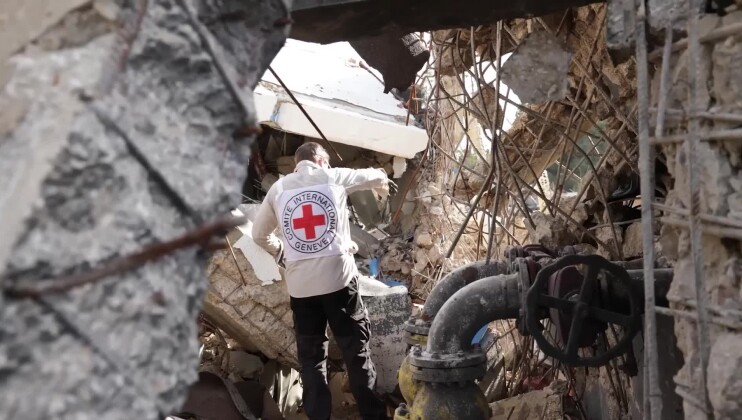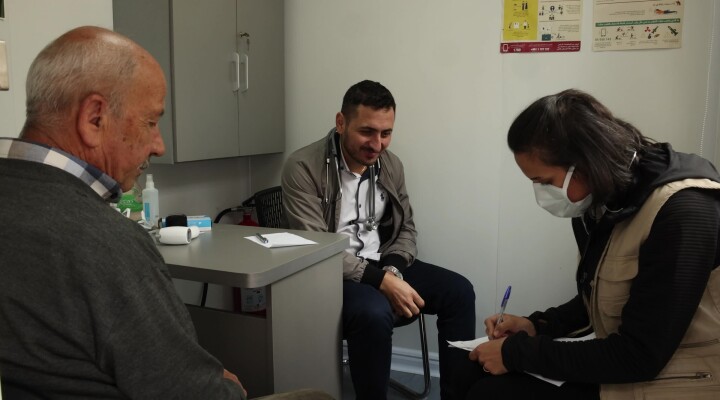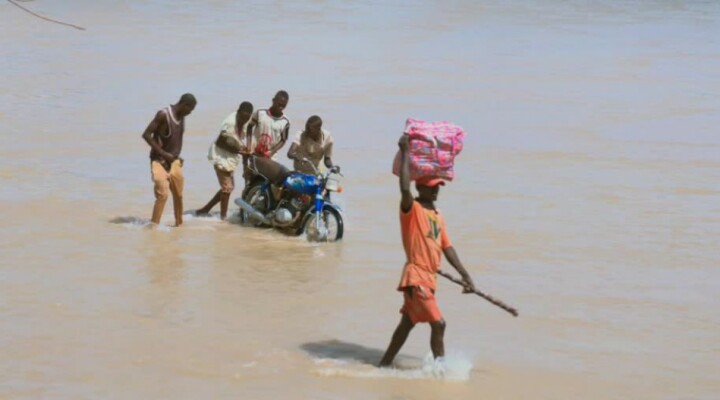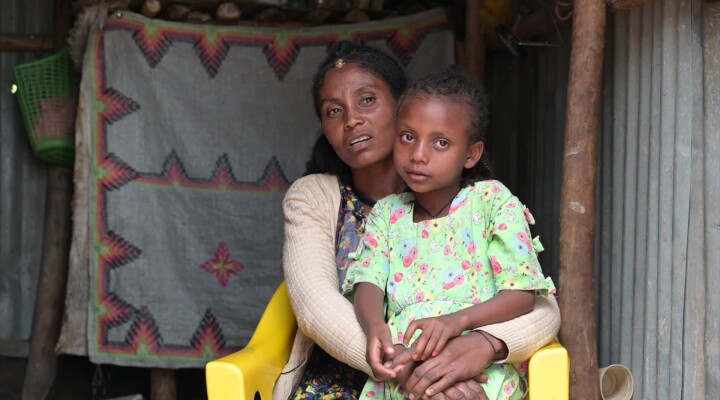Cameroon: People displaced by the conflict are exposed to devastating effect of climate shocks
People affected by the armed conflict in Cameroon find themselves severely exposed to the consequences of the devastating floods that the country has experienced in the past several weeks. Deprived of economic opportunities, many of them struggle to provide for themselves while recurrent floods, which are becoming more frequent and more severe, create an additional burden for these vulnerable families.
Collecting okra is one of the few available seasonal jobs in Far North Cameroon and flooding makes it particularly demanding. “Before cutting okra, we wrap our hands with a scarf to avoid injuring ourselves, this is how we collect it,” says Sawaga, a resident of Tilde village in Kousseri region in the Far North of Cameroon. “Of course, we suffer. We work in the water until our feet become swollen and our toenails break.”
Sawaga’s family lost their home and livelihood when they were displaced by the conflict seven years ago. This year, they faced a new disaster when the floods came. “Houses collapse. So here I am. I am with my daughters. Both lost their houses,” Sawaga adds.
Since 2014, Cameroon has received influxes of refugees fleeing the armed conflict in north-east Nigeria. At the same time, the armed conflict in Cameroon’s Far North region, combined with insecurity, poor access to basic services and climatic shocks have forced thousands of people from their homes and disrupted local agricultural production and livelihoods. Some 350,000 people are displaced in Far North Cameroon.
“Until this day, we are afraid to return to our village, because we don’t have the peace of mind,” says Ambdoulaye Issa, a resident of Tilde village. “We came here with nothing but the clothes on our backs.”
During this year’s lean season, the International Committee of the Red Cross (ICRC) has increased its assistance to the mobile nutritional centres and has assisted over 2,300 families. In cooperation with the Cameroonian Red Cross, the organization also works to improve access to clean water and heath. It supports vulnerable families with cash grants and helps increase agricultural production and vaccinate cattle.
SHOTLIST
Length: 6:23
Location: Tilde village, Kousseri, Cameroun
Date of Filming: 02.11.2022
Camera: Birom Speck
Copyright: ICRC access all
On Screen Credit: ICRC written or logo
00:00:00,000 --> 00:00:20,519
Abaganama Adoum, in a canoe, paddling across his flooded corn field (3 shots).
00:00:20,519 --> 00:00:25,719
Abaganama Adoum, in a canoe, holding an ear of corn.
Soundbite: Agabanama Adoum, a former cattle farmer who started growing crops, is an internally displaced person:
00:00:25,719 --> 00:00:31,000
“We came here because of frequent attacks by armed groups. We fled across the border to come here, to Tildé village.
00:00:31,000 --> 00:00:44,079
We went to see the village chief. He let us farm this land free of charge.
00:00:44,079 --> 00:00:54,159
It’s difficult for a cattle farmer to keep no cows at all. Especially if he doesn’t know how to fish. It’s really hard.
00:00:54,159 --> 00:01:04,799
This time of year, we can’t grow anything. Flooding had destroyed all our crops. We have to eat whatever the fishermen can catch while we wait for things to get better
00:01:04,799 --> 00:01:15,439
We barter whatever we can, the fishermen and the farmers. They give us what little they have, and we do the same for them.”
00:01:15,439 --> 00:01:37,760
Abaganama Adoum, inspecting the scrap of land spared by the flood, looking for corn to take home to his children. (5 shots)
00:01:37,760 --> 00:01:50,359
Tildé village, inundated by floodwater (3 shots).
00:01:50,359 --> 00:02:03,599
Modou has come to assess the damage caused by the recent heavy rains (3 shots).
Soundbite: Modou, son of the village chief:
00:02:03,599 --> 00:02:13,120
“Since 2016, Tildé village has made this land available to displaced people to set up home.
00:02:13,120 --> 00:02:20,439
And their children go to school over there.”
00:02:20,439 --> 00:02:55,039
Tildé village primary school where displaced children can learn to read and write (5 shots).
00:02:55,039 --> 00:03:08,680
Abaganama Adoum on his way to pick up his youngest children up from school.
00:03:08,680 --> 00:03:24,800
Abaganama Adoum meets up with Modo to survey the damage caused by the recent rainfall (4 shots).
00:03:24,800 --> 00:03:31,599
Abdoulaye Issa and two other men praying.
Soundbite: Abdoulaye Issa, the spiritual guide of the community and an internally displaced person:
00:03:31,599 --> 00:04:01,520
“We are still too afraid to return to our village; we don’t have peace of mind. So we can’t go back. It’s better for us to stay here, with the people of Tildé village.”
00:04:01,520 --> 00:04:13,840
Sawaga Idrissa wraps her hands in scraps of cloth to protect them (3 shots).
00:04:13,840 --> 00:04:33,360
Sawaga Idrissa harvesting okra (4 shots).
Soundbite: Sawaga Idrissa, an internally displaced person:
00:04:33,360 --> 00:04:43,319
“I pick the okra by hand and then put it in a sack to take home to dry.”
00:04:43,319 --> 00:04:53,040
Sometimes, if we have no money, we barter goods. Someone gives me some millet and I give them some okra.
00:04:53,040 --> 00:05:26,480
Yes, we are suffering. We have to work wading through water until our feet swell up and our toenails break. Our houses are collapsing. Here I am, with my two daughters, who have both lost their homes.”
00:05:26,480 --> 00:05:40,639
Women returning from harvesting wild okra (3 shots).
00:05:40,639 --> 00:06:03,120
Sawaga Idrissa is spreading out the harvested okra on the ground to dry in the sun.
00:06:03,120 --> 00:06:06,720
Children walking in front of the okra dying in the sun.
Soundbite: Moussa Ouattara, head of the ICRC subdelegation in Kousseri:
00:06:06,720 --> 00:06:20,399
“After the rainy season, the flooding caused by heavy rainfall prevents people from sowing seeds and growing food to eat.”
00:06:20,399 --> 00:06:23,040
This is the result of climate change.
Ends
For further information, please contact:
Alyona Synenko (English/French/Spanish/Russian), ICRC Nairobi, +254 716 987 265, asynenko@icrc.org



